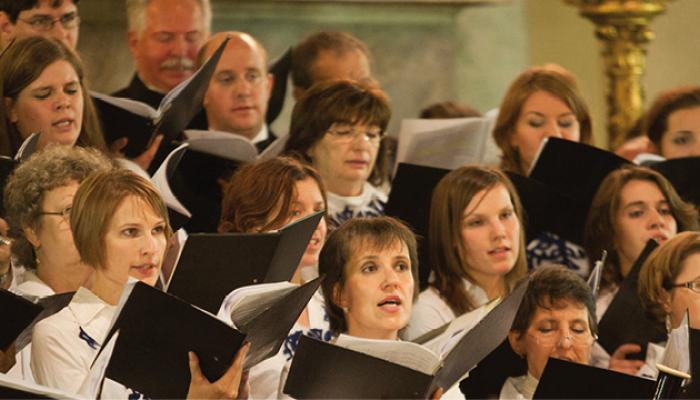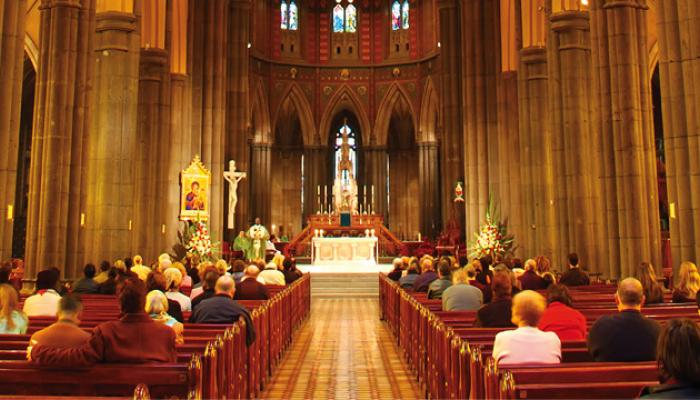
3.46 Perché tutta questa attenzione al peccato invece della speranza?
Alcuni pensano che la Chiesa dia troppa importanza al male che uno fa, piuttosto che al bene che si compie. È giusitificata questa critica? Gesù è venuto per portarci la vita in abbondanza (Gv 10, 10)Gv 10, 10: Il ladro non viene se non per rubare, uccidere e distruggere; io sono venuto perché abbiano la vita e l'abbiano in abbondanza.. Tuttavia noi tutti sappiamo per esperienza personale che commettiamo errori e peccati.
Fortunatamente Gesù non rimane fissato sui nostri peccati, e desidera con tutto il cuore perdonarci. Per prepararci all’incontro speciale con Gesù nell’Eucarestia, gli chiediamo quel perdono di cui abbiamo in continuazione bisogno. Egli ha reso possibile questo perdono per ognuno di noi attraverso la sua morte e risurrezione. Riferisciti all’app#TcDIO per la liturgia del sacramento della Riconciliazione, e per i testi della Messa in diverse lingue.
What does the Eucharist represent in the life of the Church?
It is the source and summit of all Christian life. In the Eucharist, the sanctifying action of God in our regard and our worship of him reach their high point. It contains the whole spiritual good of the Church, Christ himself, our Pasch. Communion with divine life and the unity of the People of God are both expressed and effected by the Eucharist. Through the Eucharistic celebration we are united already with the liturgy of heaven and we have a foretaste of eternal life. [CCCC 274]
What is Holy Eucharist?
Holy Eucharist is the sacrament in which Jesus Christ gives his Body and Blood—himself—for us, so that we too might give ourselves to him in love and be united with him in Holy Communion. In this way we are joined with the one Body of Christ, the Church.
After Baptism and Confirmation, the Eucharist is the third sacrament of initiation of the Catholic Church. The Eucharist is the mysterious center of all these sacraments, because the historic sacrifice of Jesus on the Cross is made present during the words of consecration in a hidden, unbloody manner. Thus the celebration of the Eucharist is “the source and summit of the Christian life” (Second Vatican Council, Lumen gentium [LG], 11). Everything aims at this; besides this there is nothing greater that one could attain. When we eat the broken Bread, we unite ourselves with the love of Jesus, who gave his body for us on the wood of the Cross; when we drink from the chalice, we unite ourselves with him who even poured out his blood out of love for us. We did not invent this ritual. Jesus himself celebrated the Last Supper with his disciples and therein anticipated his death; he gave himself to his disciples under the signs of bread and wine and commanded them from then on, even after his death, to celebrate the Eucharist. “Do this in remembrance of me” (1 Cor 11:24). [Youcat 208]
What sort of preparation do I need in order to be able to receive Holy Eucharist?
Someone who would like to receive Holy Eucharist must be Catholic. If he has a serious sin on his conscience, he must first make a confession. Before approaching the altar, one should be reconciled with his neighbors.
Until a few years ago, the practice was to eat nothing for at least three hours before Mass; that was how people prepared to encounter Christ in Holy Communion. Today the Church requires at least one hour of fasting. Another sign of reverence is to wear one’s finest clothing—after all, we have a rendezvous with the Lord of the world. [Youcat 220]
In hope we were saved, says Saint Paul to the Romans, and likewise to us (Rom 8:24). According to the Christian faith, “redemption”—salvation—is not simply a given. Redemption is offered to us in the sense that we have been given hope, trustworthy hope, by virtue of which we can face our present: the present, even if it is arduous, can be lived and accepted if it leads towards a goal, if we can be sure of this goal, and if this goal is great enough to justify the effort of the journey. [Pope Benedict XVI, Se Salvi, n. 1]





